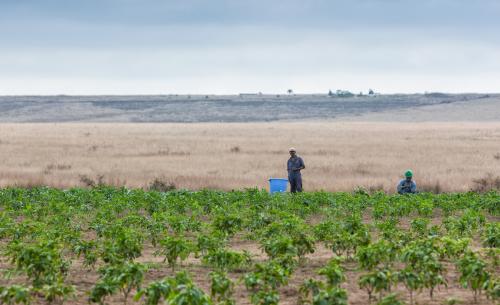When will the United States get serious about global climate change? Barely a week passes without news of some new scientific study showing that the effects of climate change will be worse than previously imagined. Massive, systematic assessments of climate science—including the Intergovernmental Panel on Climate Change, a group I have contributed to for years—regularly report on the growing scientific consensus. And, if all that seems abstract, today huge areas of the western United States are literally on fire—extreme wildfires are one of the many things that will likely become more common in a warmer world.
Yet, policy across most of the United States seems stuck. Some places like California and parts of Europe are moving ahead more quickly, of course. But the leaders only account for a small fraction of the global total emissions, and most of the leaders are falling short of pledges they made in Paris. Overall, the total global effort is falling far short. For my colleagues in the scientific community, this gap between the need for action and what’s happening on the ground is a source of extreme frustration. We can work harder to show the science is solid, but the problems aren’t scientific—they are political.
In all this bad news about policy inaction, there is also some bad news emerging in climate science that might change the picture. Two bads could change the political landscape on global climate policy. That’s the message from a team of us, published last month in Foreign Affairs.
For decades, most of the science about the impacts of climate change has focused, inconveniently, on impacts that will disproportionately hurt poor nations and peoples. Rising sea levels, for example, could wipe out poor small island countries. Higher seas and stronger storms could, as well, put millions of Bangladeshis under water, and with greater threats of the storms and surges they already suffer. In the rich countries, strong storms and higher seas will have a big dollar impact—witness superstorm Sandy in New York and New Jersey, or Harvey in Houston last year—but, in the bigger picture, these rich societies have the resources to respond. As political scientist Aaron Wildavsky put it in a famous essay from the 1980s: “Richer is Safer.”
Politically, the Wildavsky logic creates huge problems for global climate policy. That’s because most greenhouse gas emissions come from richer countries (although the middle-income nations such as China and India are rising quickly) but the impacts are felt the most in the poorer nations. Worse still, nearly all greenhouse gases are stock pollutants—they build up in the atmosphere over decades. Societies today can spend a lot of money to control emissions, but the full benefits won’t be felt for a long time. These geophysical attributes of climate pollutants define the politics for the most part: Solving the climate change problem requires that richer countries (which are the biggest emitters, mostly, and must take the lead) spend large resources for benefits that accrue far into the future, and mostly in other societies.
Some of the new science on climate impacts will change those politics. Particularly notable, as we say in the new Foreign Affairs essay, is the science around the impacts on disease and human health. While the Wildavsky logic still applies—richer societies are more resilient to health impacts, to a point—the effects of climate change as a catalyst for disease could become a great leveler for exposure. It’s one thing when climate harms remote communities who are unknown and have no political voice within the rich countries, but it’s quite another when the harm hits home. And, psychologically, when those harms hit our bodies, the political effects may be greater still. Richer is no longer automatically safer.
It’s quite another when the harm hits home.
Even if political support for climate action grows, there is still a lot that needs to be done. Segments of the population in the United States and abroad still don’t want to believe climate science—a form of denialism that is less rooted in industrial politics and more ideological, especially for the right wing of the Republican party and its denialist compatriots overseas. Even in places that are leading the policy charge—like my home state of California—we have yet to devise a strategy that converts leadership into wider followership, which is what matters.
Building the political support needed for effective climate policy has proven to be a devilishly difficult task. Scientists have, increasingly, found themselves on the periphery of that task. But the new science of climate impacts could change that.




Commentary
Can climate science shift climate politics?
August 28, 2018